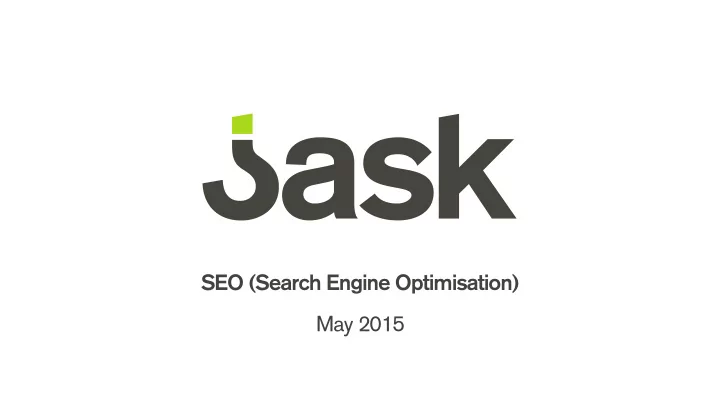

SEO (Search Engine Optimisation) May 2015
What is SEO? ‣ Optimisation of your website that will give your service or product the best chance of being found by users looking for what your organisation offers ‣ Ranking and visits are the first step to converting visitors into buyers or users who become engaged with your site. ‣ Ranking for irrelevant search queries or attracting irrelevant visitors will not further the aims of your organisation.
Who are the search engines? ‣ Large, global businesses that aim to offer the most relevant results to anyone using their service to search the web ‣ Google has approx 95% share in UK and Europe ‣ Constantly refining their algorithms to stay ahead of competition ‣ Increasingly using mined data to make refinements in search
Who can benefit from SEO? ‣ Any company or organisation that will see a benefit from being found by people searching the web ‣ SEO is a commercial marketing decision that is unique to every company ‣ Massive returns for: car insurance, gifts, finance, etc ‣ Limited returns for: newsagents, very specialised industries, etc
How does it work? ‣ Search engines crawl and index billions of documents, pages, files, videos and other media ‣ They use this information to answer user queries through listing relevant web pages ‣ Pages are retrieved and ranked for relevance and popularity - SEO needs to improve a search engine’s perception of both of these factors
Some work can be done on your site ‣ Referred to as ‘on page SEO’. This covers the technical structure of your site and the inclusion of keywords. ‣ Following the rules of the search engines in how they like websites to be structured to make it easy for their crawlers to understand ‣ Sites must now be mobile friendly ‣ Flash, shockwave and images are all examples of things that can’t be crawled by search engines ‣ Increasing navigation speed and performance of your site
Most work is content driven ‣ Unique content should have a real value to your target audience ‣ If your content has value, people will share links to the content on your site, increasing the relevance and authority of your site ‣ Content can be promoted socially and across the web, encouraging new visitors to engage with your site ‣ Create content for your audience first and the SEO benefits will follow
Black Hat SEO ‣ There used to be a lot of SEO shortcuts ‣ There still are shortcuts but not many and search engines are punishing these sites hard ‣ Always avoid: keyword stuffing, hidden text and links, and above all, low quality links into your site - these are hard to rectify!
SEO in 2015 ‣ Search users expect more relevant results and a slicker web experience ‣ Matching keywords have become matching topics ‣ SEO data is becoming locked down to drive analysis through paid for search (PPC) ‣ Increased integration of social / other online ‣ Mobile friendly site now key to ranking for mobile devices
What is PPC? ‣ Paid for search that sidesteps organic rankings ‣ More sales / enquiry focussed than organic SEO ‣ Conversion is key - the aim is to only pay for the most relevant visitors and to have landing pages to convert their visit into an enquiry ‣ More integrated with SEO now as a way to test what search topics to invest in
Thank You!
Recommend
More recommend